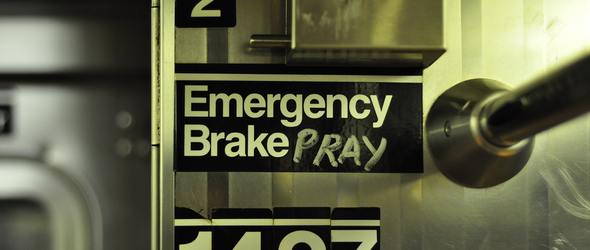Via euobserver.com
The EU’s economic super-watchdog has warned that “many risks” remain to the stability of the EU’s financial system and that the global crisis will last for many more years to come.
The two deputy chairs of the new European Systemic Risk Board – the bloc’s new Frankfurt-based supervisor of supervisors tasked with oversight of the financial system within the Union – gave a frank assessment of the state of capitalism in Europe in their first hearing before the European Parliament’s economics committee.
“There are still many risks to the recovery of the European economy,” said Mervyn King, the ESRB’s first vice-chair and head of the Bank of England.
“The economic challenges will last for many years … The financial crisis is very far from over and the impact will be felt for many years to come.”
He and his fellow vice-chair, Andrea Enria, also the head of the European Banking Authority, said that the eurozone’s sovereign debt crisis is not the only danger present.
Enria warned that systemic risk still lies outside regulated areas and that financial innovation is happening so rapidly these days that even in the case of appropriate regulation, capital is already able to pick up stakes and move on to another, unregulated area.
He said that the ESRB, which opened its doors in January, faced “significant challenges” both in data collection on systemic risk and on the credibility of that data.
King meanwhile said that the board may have to argue for a limiting of credit growth or take on climbing asset prices, recommendations that may not be very popular amongst financial institutions when the going is good.
“At times the ESRB will be doing things that are unpopular … We will need your support,” he told the lawmakers. “We will need the help of parliament to take on financial institutions that sometimes have enormous lobbying power.”
He added that banks are capable of winning control of the regulation that is supposed to reign in excesses.
“Regulatory capture is one of the problems that any system faces in trying to manage financial institutions. The wealth and power they command means we should take regulatory capture very seriously,” King said.
King also warned against a rise in long-term interest rates given the groaning public and private debt levels in Europe.
“The sheer volume of debt is still very large,” he said. “If the current climate of very low interest rates were to change, and interest rates were to rise, the economic challenges of high levels of indebtedness would become more severe.”
The pair also said that the results of stress tests on major EU banks are set to be released in June and that governments need to be ready to act immediately once the assessments are made public.
Enria warned: “Backstop measures need to be there prior to the publication of the stress tests.”
By the second half of June, governments must be ready to recapitalise banks, his colleague added. “It would be most unfortunate if the stress tests were to appear, and there was a gap,” King said.
However, they also said that the banks’ performance in the tests should not be seen as a pass-fail dichotomy, but that there was more a spectrum between being in the clear and having problematic balance-sheet holes revealed.
Other forms of action than immediate recapitalisation could be taken in such circumstances, said Enria: “The type of actions could be more varied than just raising core capital and raising it very fast.”
“A window of six months within which we would expect remedial actions to be taken.”
Enria also said the ESRB is readying itself to take on the ?shadow banking sector’, with technical work on the area soon to be under way.
He described the sector – involving investment banks, hedge funds, money market funds and insurance firms, which are not subject to the same safety regulations as normal banks – as “very difficult to bring into a unified framework,” however, as the sector was “quite diverse across jurisdictions.”
He said that he was “very keen” to get to work on shadow banking, which he described as an “oxymoron”: “Everything that is banking should not be in the shadows. It is very much dealing with systemic risk.”
He went on to say that there were two possible responses to the problem: “Bring everything generating risk under the regulatory umbrella or restrict those activities that encourage systemic risk.”
“But it will require time,” he added.





Soooo, we had the most huge earthquakes in past 2-3 yrs, worst wars (WW2, Vietnam, Middle East).. Islam/Christian conflict to the max.. financial melt-down last 2 years, planet is being poisoned by us, nuclear accidents galore, no end of end-time events already coming to pass…
Did we miss the Rapture ? Did we miss the “Signs” .. help me here.. I’m stockpiling (for past 5 years) food, water, gold coins, clothes, hats, shovels, seeds …) Did I miss sumthun ?
Don’t exactly know what you mean by missing anything…
The signs of the times Jesus talks about in Matthew 24 are are all around us and as we are getting close to the last days they are becoming more frequent.
And noone is going to miss the rapture “Behold, he cometh with clouds; and every eye shall see him” (Rev. 1:7) – Every eye shall see him, so you can’t miss it.
(Although this particular article just brings out the point that the economic crisis is not over yet)